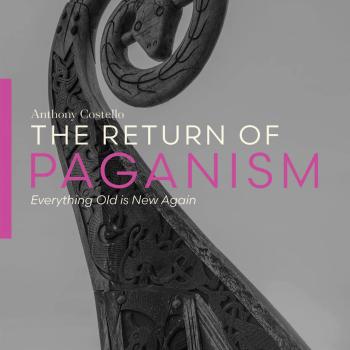Forgiveness is not a Pagan virtue. Read the stories of our ancestors and you’ll find a lot on honesty, perseverance, and reciprocity. Not much on forgiveness.
As modern Pagans, we live in a society dominated by Christianity and Christian concepts. Forgiveness is assumed to be a good thing. It’s the sign of an enlightened individual, and sometimes it’s necessary for our own well-being.
This attitude is unhelpful and ripe for exploitation. We need only look at the instances where victims of abuse have been pressured to forgive their abusers, who suffered no consequences and went right on abusing vulnerable people.
The misuse of forgiveness in Christian communities is a matter for Christians to address. As Pagans, we need to know what forgiveness is, when it’s appropriate, and what alternatives we have to forgiving those who wrong us.
The purpose of forgiveness is restoring relationships
Insults, injuries, and other offenses damage relationships between people. Hurtful words cannot be unsaid and harmful actions cannot be undone. Once lost, trust is difficult to regain.
But we recognize that losing a friend would hurt even more. And we also recognize sometimes we’re on the active end of the offense, whether through ignorance or carelessness or simply because we’re not as virtuous and pure as we like to think we are.
Forgiveness recognizes that the whole person is so much more than the bad things they did. Forgiveness says “you hurt me, but I’m not going to let that hurt ruin our relationship.” It says “I’m not going to hold it against you – let’s move on.” Under the right circumstances, this is a very good thing to do.
Preserving and restoring relationships is the only valid purpose of forgiveness. If you’re using it for another reason, there’s probably a better way.
Forgiveness begins with repentance
For minor slights that don’t make any substantial difference, proactive forgiveness is fine… though I see that less as forgiveness and more as tolerance of the fact that we’re all unique and different individuals.
But for any offense where significant harm was done (and hurt feelings are real harm – you don’t get to decide if someone else is “being too sensitive”), forgiveness begins with the offender saying “I was wrong.”
Not “please don’t hold it against me” and not even “I’m sorry you got hurt.” But “I know what I did was wrong and I’ll do my best to not do it again.” Explanations may help you understand that the offender didn’t mean to hurt you – intention matters, even though it isn’t everything. But if someone asks you to forgive them without giving you assurances that they’re going to at least try to do better in the future, they’re just asking you to roll over and accept continued abuse. Forgiveness here isn’t noble – it’s unethical.
Sometimes people can’t bring themselves to say “I’m sorry.” Instead, they just stop doing what was harmful and start doing better. That’s good enough for me.
But what do you do if people won’t repent? Some in our society say you should forgive them anyway. Otherwise, they say, you’ll never heal from your injury.
These people are wrong. There are other ways to take care of yourself that don’t involve excusing the bad behavior of others and facilitating further injuries and offenses.
Arya’s list
Game of Thrones gave us Arya’s list. Every night Arya Stark recites a litany of names of people who have harmed her and her family – she intends to kill them all. With one season left in the show (it’s becoming obvious the books will never be finished) she’s crossed off quite a few names.
The human desire for vengeance is strong. Someone hurts us – we want to hurt them back. This is a primal impulse from deep in our evolutionary past… and it’s rarely a good idea. Confucius didn’t say it, but it’s still true: “Before you embark on a journey of revenge, dig two graves.” Even if you and your enemy don’t end up killing each other like two gunfighters in an old Western, the desire for revenge will consume you.
Sometimes that’s OK. Simon Wiesenthal survived the Nazi concentration camps, then devoted his life to hunting down Nazi war criminals and bringing them to trial. Some things can never be forgiven. There is no statute of limitations on murder… or on genocide.
But few offenses – even serious offenses – rise to this level. Fortunately for us, there are several alternatives in between revenge and forgiveness.
Binding
Binding is a magical operation where the magician constrains someone from doing something. Sometimes it’s to prevent general harm (as in the famous binding scene near the end of The Craft) but as with all magic, the more specific the target the better chance of achieving favorable results.
There are lots of ways to do a binding. You can create a poppet and bind it with cords. You can put a representation of the person in a jar, or in the freezer. You can make the binding permanent, or release it at some point, or give them a way to unbind themselves (usually by changing their ways).
There’s a lot of misinformation about binding in the Pagan community. Namely, that if you bind someone you’ll bind yourself to them. Beyond the concerns about being consumed with revenge discussed above, there’s simply no magical reason to expect that to be the case. There’s also the rather naïve idea that interfering with someone’s free will is the Pagan equivalent of a mortal sin. If someone has harmed you in the past and is likely to do so again, tolerating their “free will” is worse than interfering with it.
The mundane equivalent of binding is a restraining order. Consider binding to be of equal seriousness.
Banishing
Banishing is part of the magician’s basic toolkit, whether in rites like the Lesser Banishing Ritual of the Pentagram (LBRP), house cleansings, or more informal workings that tell unwanted spirits “you’re not welcome here, get out!”
Banishing living humans can be challenging. But do a little looking in the Traditional Witchcraft realm and you’ll find spells to make annoying neighbors move, or to get rid of rivals in business or in love. If you don’t find one that fits your circumstances exactly, find one that’s close and adapt it.
It may be that you still have feelings for someone and you don’t want them hurt – you just want them out of your life for good. Work magic for them to get a job offer they can’t refuse – on the other side of the country.
Banishing someone using only mundane methods generally requires more money and power than most of us have. If you can’t move them, you may have to move yourself. But give magical banishing a try first. And as always, if you’re not up to it, find a competent witch and pay them to do it for you.
Shielding
Not every situation requires a response at the level of binding or banishing. Not every relationship is important enough to invest time and energy in restoring it. Sometimes all you really care about in a situation is that you don’t have to deal with it anymore.
Shielding is Paganism 101 level practice, maybe 102. There are many different ways to shield – I use a version of energy magic. Make and wear an amulet or other charm of protection. Invoke your ancestors and spirit allies. If one version isn’t enough, add another. Just remember that shielding isn’t a once-and-done thing. Shields need to be recharged regularly – I recharge mine every morning.
I don’t know if there’s a mundane equivalent of shielding. Meditation helps, as does developing an attitude of IDGAF. I’m not very good at those, so I shield.
Moving on and living well
Well-meaning people tell us we must forgive those who harm us so we can get on with our lives. How about we just get on with our lives?
There are a few people from my past who harmed me greatly. If they expressed genuine remorse I would forgive them. And, if they didn’t and if I had the opportunity (meaning I knew I wouldn’t go to jail), I would exact revenge in ways that are not in alignment with my higher values.
Neither of those situations are likely to happen.
But when I’m focused on living my life and doing the work I’m called to do, those people never enter my mind. Oh, I’m thinking about them right now, because I brought up the topic. But as soon as I’m done writing this post, they’ll fade away again. Or more precisely, those thoughts will be crowded out by the thoughts of what I’m doing here and now.
I’m not going to dismiss the harm they caused, because if they ever come back into my life I want to be prepared to deal with them. But neither am I going to stay stuck in that point in time. I’ve moved on, and that’s what I’m going to keep doing.
Forgiving someone who doesn’t deserve it has never worked for me. Doing the things I want to do and doing them well has helped me forget some very bad things.
Do not misread this as saying it’s OK to tell hurting people “just move on and get over it.” That’s as unhelpful as telling them “just forgive and forget.” Either way, what you’re telling them is “I don’t care that you’re hurting – I just don’t want to have to deal with it.” And that’s cold and callous.
Forgiveness has a place in Paganism
We all screw up from time to time. We hurt other people and they hurt us. In most cases, our relationships are more important than our injuries, and we are wise to forgive people who say “I’m sorry” and who give us any indication they mean it.
But some people ask for forgiveness with no intention of changing their ways. Some people tell us we must forgive because they don’t want to upset the offender, or because they don’t want to have to acknowledge just how deeply we’re hurt.
Forgiveness in those situations isn’t noble or holy or enlightened. Forgiveness in those situations is enabling further harmful behavior.
Forgive those who genuinely repent. There are better ways to deal with everyone else.




















